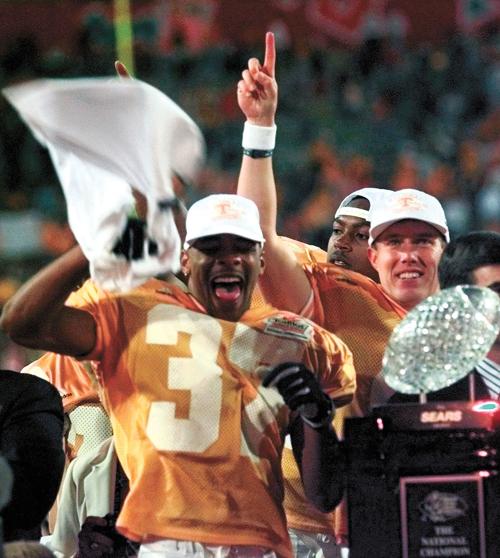January 4, 1999, 25 years ago: The Fiesta Bowl is played at Sun Devil Stadium on the campus of Arizona State University, in the Phoenix suburb of Tempe, Arizona. It was the 1st game played under the Bowl Championship Series system, with the intention of selecting a definitive National Champion, something college football had never had before.
The Fiesta Bowl had hosted de facto National Championship games before, because it didn't have an automatic league tie-in: The Rose Bowl in the Los Angeles suburb of Pasadena, California had the Big Ten and Pacific-10 Champions play each other; the Big Eight, and now Big Twelve, Champions were locked into the Orange Bowl in Miami; the Southeastern Conference Champions were locked into the Sugar Bowl in New Orleans; and the Champions of the now-defunct Southwest Conference were locked into the Cotton Bowl Classic in Dallas.
But, effective with the 1998 season, the BCS was determined to make it official. As a result, the NCAA allowed Conference Champions to opt out of their usual bowls, and play in the BCS National Championship Game, if they finished the last pre-bowl national poll ranked Number 1 or Number 2.
The Number 1 team in the last 1998 poll was the University of Tennessee, coached by Phillip Fullmer. For 4 years, the Volunteers had been an elite team, led by quarterback Peyton Manning, but they couldn't get past the University of Florida in the SEC. Now, their quarterback was the less-heralded Tee Martin, but they had a better all-around team, going 12-0, beating teams then ranked Number 2 (Florida), 7 (Georgia, away), 10 (Arkansas), 17 (Syracuse, away), and 23 (Mississippi State, in the SEC Championship Game).
The Number 2 team was Florida State University, coached by Bobby Bowden. The Seminoles opened the season by beating Number 14 Texas A&M at the Kickoff Classic at the Meadowlands, but then stumbled with a 24-7 loss away to North Carolina State.
They followed it by dropping 62 points on Duke, and beating Number 18 USC. They beat Clemson 48-0, then went to Atlanta and beat Number 20 Georgia Tech. They beat Number 12 Virginia, and won the Atlantic Coast Conference Championship. And they had to get past Number 4 Florida, beating them, 23-12 -- and they didn't need overtime to beat Florida, as Tennessee did. Perhaps that's why, despite having a loss, the Seminoles were favored by 5 1/2 points.
The 'Noles had been National Champions in 1993. The Vols, despite many good teams over the years, last won a National Championship in 1951.
The 1st quarter ended scoreless. In the 1st minute of the 2nd quarter, Martin threw a short touchdown pass to Shawn Bryson. On the next drive, the Vols' Dwayne Goodrich intercepted Marcus Outzen, and took it in 54 yards for a touchdown. It was 14-0 Tennessee.
Outzen drove the Seminoles to the Volunteer 1-yard line, and William McCray scored. Still fuming over missed field goal attempts earlier in the decade, Bowden had recruited Sebastian Janikowski, a 6-foot-1, 255-pound native of Wałbrzych, Poland, who grew up in Florida, and became the top high school kicker in the nation. But Janikowski missed the extra point on this touchdown. He made up for it on the last play of the 1st half, kicking a 34-yard field goal. It was Tennessee 14, Florida State 9, and still anybody's ballgame.
Goodrich, whose interception had been key, and had been assigned to cover Outzen's favorite receiver, All-American Peter Warrick, did not return for the 2nd half, having sustained an ankle injury. He was replaced by Gerald Griffin, who had hardly played, but limited Warrick to a single catch.
The 3rd quarter saw no scoring. With 9:17 left in the 4th, Martin threw to the superbly named Peerless Price, and he took it 79 yards for a touchdown. But as had Janikowski, Vols kicker Jeff Hall missed the extra point. With 6 minutes left, Hall again followed Janikowski's pattern, and kicked a field goal, from 23 yards out. It was 23-9 Tennessee.
Florida State wasn't done. There was still time for the 2 scores they needed. Outzen got them to within 7 yards, and scored on his own run with 3:42 left, to make it 23-16. Their defense forced a fumble by Travis Henry, and they had a last shot with 2 minutes to go. But Outzen threw a pass that was intercepted by Steve Johnson, and that was the ballgame, and the National Championship: Tennessee had won.
The BCS didn't always work as intended. There would always be a team stuck at Number 3, sometimes even Number 4, that thought it deserved to get into the final game. Finally, taking effect with the 2013 season (settled in early January 2014), a College Football Playoff National Championship system was set up.
Except that the new system, as had the BCS, allows teams that didn't even win their Conference, sometimes not even their Division -- read: Alabama or a team that lost the SEC Championship Game or West Division to Alabama -- to be one of the last 4.
There is no perfect system. It may just be that the hated BCS is the best system we have yet had.
In 2023, Sun Devil Stadium was renamed Mountain America Stadium.
Also on January 4, 1999, the New Jersey Devils' Swiss star Nico Hischier was born.


No comments:
Post a Comment